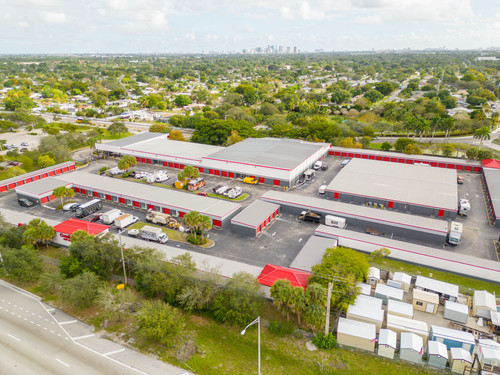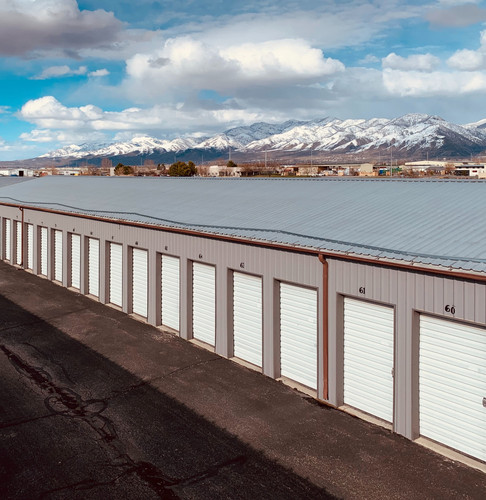Is Owning a Storage Unit Business Profitable in 2026?
The rapidly growing state of the self storage industry implies it's a great business - but how profitable really is the sector?

In 2023 alone, the United States recorded 5.5 million filed applications to begin a new business. However, how many of them make it? With the BLS putting first-year business closure rates at 20%, is owning a storage unit business profitable?
Owning storage businesses can be profitable for those with the right resources. With the right self storage software and business plan, you can generate a steady income from your storage unit business. Intelligent self storage marketing strategies can also help you attract customers and turn them into repeat clients.
In addition to outlining the annual income from owning storage units, this guide also provides credible data on the annual income from owning storage units.
Download the ultimate Self Storage e-book
Everything you need to know about setting up your self-storage facility.
Download for FREEIs Owning a Self Storage Business Profitable? (Quick Answer)
In short: yes, owning a self storage business is profitable if done right.
The annual income from owning storage units can range from $100,000 to $1,000,000. However, how much money you make hinges on several factors, such as the facility’s location and size, whether or not you had to take out a loan to buy it, and the range of services you offer.
Seeking a self storage business in a high-demand location will increase your chances of maximising profits even if your prices are low. Similarly, consider providing extra services that your consumers could appreciate. You could, for instance, market packaging materials such as boxes and tape.
How Much Profit Do Storage Unit Owners Make?
If you’ve ever pondered the question, “how much does the average storage unit owner make?" or "How profitable are storage businesses?” Here’s your answer: owners of storage facility businesses typically earn a yearly profit of $184,500.
Naturally, the potential payoff for each storage unit facility will vary based on the facility’s size, local rental market, and operational efficiency. The $184,500 mentioned is based on an average annual rental rate of $9 per square foot, an average storage unit facility size of 50,000 square feet, and a profit margin of around 41%.
Why Is Self Storage Profitable?
Having addressed the query, “is the storage business profitable?”, it’s only fair that we provide reasons as to why self storage is profitable.
Most people have a lot of possessions but need somewhere to store them — not everyone wants to end up in an episode of Hoarders. Reports show that an impressive 38% of Americans have rented a self storage unit or planned to do so in the future — a 5% jump from the 2020 figure.

Military personnel, students, and people who are downsizing or relocating to a new house are some of the most typical people considering self storage options. According to the most recent census estimates, 15.3 million households relocate annually in the US, meaning that each one must leave some unwanted belongings behind, needing storage.
Self storage has shown to be a viable business that can cater to customers of all ages. The baby boomer generation accounts for 21.16% of the US population and should be taken into account because they’re the ones who downsize most frequently. Gen Z accounts for 20.67% of the population, Gen Xers contribute 19.83%, while millennials (who seem to be taking over the self storage industry) account for 21.75%.
These statistics make more sense when you consider that Gen Xers, baby boomers, and millennials have a 54%, 51%, and 40% likelihood of employing self storage services, respectively.
Many operators of brand-new storage facilities overlook college students as possible renters. Yet, they make for ideal customers since, as we all know, a dorm room doesn’t leave much space for storage, and they move houses each year. You should consider employing tactics to get more student renters, especially during the school season.

Overall, the economy’s expansion, the rise in household income and size, and the increase in population are the accurate engines behind the rising need for storage space. With the world’s population expected to keep advancing and the need for storage space growing, this is terrific news for entrepreneurs interested in venturing into the self storage industry.
For more insights into the profitability and statistical analysis of the self-storage industry, explore our detailed self storage industry statistics.
6 Factors Influencing the Annual Income From Owning Storage Units
For established self storage facility owners and new investors, understanding the factors influencing annual income is crucial for success.
Here are 6 key factors that can significantly impact annual income from owning storage units:
-
Location: The location of a self storage facility plays a vital role in determining its income potential. Facilities in densely populated areas or near residential neighbourhoods tend to attract more customers, resulting in higher occupancy rates and increased revenue. Access to major highways or busy thoroughfares can also increase visibility and convenience for potential renters.
-
Unit Size and Type: The size and type of storage units available can impact annual income. Offering a variety of unit sizes allows owners to cater to a broader customer base, accommodating individuals and businesses with diverse storage needs. Additionally, providing specialised units such as climate-controlled storage options or vehicle storage can increase rental rates, boosting overall income.
-
Rental Rates: Determining the appropriate rental rates for self storage units is vital to maximising annual income. It’s essential to strike a balance between competitive pricing and maintaining profitability. Conducting market research and analysing local competitors can help owners determine optimal rental rates that attract customers while ensuring a healthy return on investment.
-
Occupancy Rates: The percentage of occupied units within a self storage facility directly impacts annual income. Higher occupancy rates translate into increased rental income, while lower rates can lead to revenue loss. Implementing effective marketing strategies, providing exceptional customer service, and ensuring a well-maintained facility can help attract and retain customers, boosting occupancy rates and overall income.
-
Ancillary Services: Additional services beyond basic storage units can contribute to increased annual income. These services may include selling packing supplies, providing truck rentals, offering insurance options, or partnering with moving companies. By diversifying revenue streams, self storage unit owners can enhance profitability and create a more comprehensive storage solution for customers.
-
Operational Efficiency: Efficient operational practices can significantly impact annual income. Streamlining processes, optimising staff schedules, and implementing self storage management software can reduce costs and increase overall revenue. In a nutshell, self storage unit owners can improve their bottom line by maximising operational efficiency.
The Relevance of Net Operating Income to Self Storage Businesses
Real estate investors and entrepreneurs rely on net operating income (NOI) to gauge a property’s financial health. In the same vein, a self storage investor may draw valuable insights from this critical metric.
You may calculate the net operating income by subtracting the operating costs from the entire period’s sales. Let’s illustrate how NOI comes into play within the self storage industry and how it applies to established REITs.
The five publicly traded US self storage real estate investment trusts (REITs) often reveal NOI when disclosing financial results to investors.
The most important real estate investment trust (REIT), Public Storage, reported nearly $1.75 billion in same-store NOI in 2020. This metric compares the profitability of identically situated properties that have been open for a minimum of 12 months. Compared to the 2020 value of 9.4%, Public Storage saw a same-store NOI increase to 11.9% in 2021.
One other self storage REIT, Extra Space Storage, reported an approximate same-store NOI of $770 million for 2020. What’s more, the organisation predicted the NOI to increase from 13.5 in 2020 to 15.5% in 2021.
Boosting your annual income from owning storage units goes beyond focusing on sales growth alone. Other significant additional costs that may slash your company’s profitability include debt servicing, snow removal, and property taxes.
Return on Investment (ROI) for Self Storage Businesses
How profitable is a self storage facility when offering a return on investment (ROI)? The ROI is another metric that can assist in approximating profitability for self storage business solutions. The two major forms are cash-on-cash ROI and capitalisation rate ROI.
According to Investopedia, cash-on-cash ROI calculates the rate of return on cash invested in a property every year. The ROI calculated in terms of cash flows is often reported as a percentage. “It’s considered relatively straightforward to understand and one of the essential real estate ROI metrics,” the site states.

Chron.com defines the capitalisation rate ROI as the profitability ratio calculated by dividing the return on investment (otherwise known as the ROI) by the cost of acquiring the storage facility. A facility’s capitalisation rate, or “cap rate,” is a more common term in the self storage sector than the ROI cap rate
Since down payments can vary widely and skew results, experts recommend using the purchase price rather than the down payment when calculating the cap rate.
The average capitalisation rate (cap rate) for self storage facilities is 6.5%, while the cap rate for retail and office properties is typically 5%. However, cap rates change over time and differ from property to property based on the underlying economics and location.
Financing a Storage Unit Business
An SBA (small business administration) bank loan can be a great way to fund the purchase of an existing storage facility or the building of a brand-new one. Since the principal use of the loan proceeds will be for real estate and a storage unit facility can be used as collateral, you may get a longer term with an SBA 7(a) loan. SBA 7(a) loans can give terms of up to 25 years, offering great flexibility in repayment options.
Should You Invest in Self Storage?
If you’re looking to start a new business and still on the fence about whether or not to invest in self storage, we’d suggest you get on with it, and for valid reasons. For one, revenue for the sector reached $39.5 billion in 2022 in the US, with an average occupancy of 92%. What’s more, the average profit margin throughout the industry sits at an impressive 41%, indicating a profitable business.
Your new storage facility can be anything from a simple, one-story drive-up to something more complex, such as a climate-controlled establishment or multi-story building. While the business may have a slow start, most establishments can still turn a profit once they attain an occupancy rate of 60–70%.

Summarily, self storage facilities are an excellent option for those entirely new to establishing a business. It’s proven successful more often than not, so don’t write it out as a possibility for your new venture. We’d suggest you read through our comprehensive guide on starting a self storage business to know how to go about the entire process.
6 Reasons Why You Should Invest in Self Storage
There are several reasons you should consider a self storage investment, some of which have been touched on at some point in this extensive guide. However, here’s a more detailed outline of 6 important reasons:
-
Self storage businesses are thriving.
-
High return profits.
-
Continually growing industry.
-
Minimal experience requirements.
-
Offers versatility in terms of management options.
-
Multiple options exist for generating extra money.
There are several reasons you should consider a self storage investment, some of which have been touched on at some point in this extensive guide. However, here’s a more detailed outline of those reasons.
1. Self storage businesses are thriving.
Self storage businesses have a high likelihood of success, but a new firm’s risk of failure is still always present. You may choose to look on the bright side by considering that 92% of new businesses prosper in this industry. As a result, many lenders provide loans to self storage entrepreneurs to fund the facility-building process, with some requiring to pay a deposit of as little as 10%.
2. High return profits.
The profit margin for firms with high capital requirements, such as restaurants, is 3–5%. On the other hand, profit margins on annual income from owning storage units can be up to 11%. This way, you may recoup the original cost of constructing a self storage facility more quickly than in other types of business.
3. Continually growing industry.
Nonetheless, forecasts suggest that the self storage business will expand by more than 5% yearly through 2023 up to 2027. Aged individuals moving into assisted living facilities, divorcing couples who rent rather than buy, downsizing families, removal companies for short periods, and graduating college students contribute to the industry’s growth.
4. Minimal experience requirements.
Any investor looking to invest in certain industries, such as the hospitality and infrastructure development sectors, requires adequate experience in such fields. Alternatively, they tend to seek the counsel of professionals, resulting in extra expenses. On the other hand, self storage managers barely need any specific experience to succeed. However, you may enrol for digital self storage certification classes organised by the Self Storage Association (SSA).
5. Offers versatility in terms of management options.
Self storage companies may have less contact with their clientele than other businesses. Since self storage is primarily a “self-service,” “hands-off” industry, it can be managed effectively by a small group or even an individual. In fact, over 75% of businesses are owned by independent managers.
Furthermore, having a reliable automated security system in place slashes the number of security guards needed, thereby saving money in the long run. The only time management may need to contact tenants is when they sign contracts, pay rent, and vacate.

Essentially, a wide range of participation levels is available to you as an owner. You might operate the facility independently, employ a manager, or contract the management entirely to a management company. The last two management options afford you the luxury of time so you can focus on other projects you may have.
6. Multiple options exist for generating extra money.
Many kinds of income are available to those who own a storage facility, and some are unique to the storage business. Popular extras that many storage facilities provide include the sale of moving supplies and the leasing of moving trucks. You may also increase the profitability of your self storage company by offering a tenant protection package.
3 Challenges Associated With Operating a Self Storage Business
As good as owning a self storage business may seem, it does have some drawbacks, as with any other business.
Here are the most prominent ones:
-
Finding qualified employees may take some time.
-
Locating an ideal spot may prove difficult.
-
Security is a necessary expense.
1. Finding qualified employees may take some time.
Good management is essential to the success of a self storage business, as with any other field. Given the typically modest size of storage facility teams, each member of your group must shoulder a sizable burden. Hence, hiring competent managers and executives is critical to ensuring smooth business operations.

Finding qualified personnel to fill managerial roles in your company can be time-consuming and challenging. Therefore, if you eventually have access to competent hands, you should endeavour to reward success with fair pay and respect, synonymous with the level of responsibility they’re handling.
2. Locating an ideal spot may prove difficult.
Location is critical for any storefront enterprise, and self storage enterprises aren’t an exception. Easy access and excellent visibility are two essential qualities of a good location.
The occupancy rate of a storage facility might be severely impacted by its location if it’s difficult to get to or if it’s not visible from the main road. If you’re building from the ground up, this may be an easy factor to consider when selecting a site. Still, if you’re buying an existing building, you must be aware of any opportunities to improve the building’s visibility.
3. Security is a necessary expense.
To ensure the safety of tenants’ possessions, a storage facility must implement stringent security measures across the entire site. Any criminal activity on your property can damage the trust of your tenants, who depend on you to keep their belongings secure. Therefore, it’s in your best interest to take security seriously.
All of your security equipment—from the gate’s entry and controls to the building’s surveillance cameras and locks on residents’ units—should be current, well-maintained, and fully operational at all times.
The safety measures for warehouses have improved as technology has progressed. Maximise your initial investment, after which you can continue to put money back into your company by upgrading systems as necessary and financially feasible. Some updates and system installations can be pricey, but they’re essential for your company’s development and the security of your customers’ possessions.
To learn more about how often self storage units get broken into, check out this blog.
Conclusion
So, is owning a storage unit business profitable in the long term? Yes, it is. You can generate substantial annual income from owning storage units if you set up your business appropriately.
However, as with any business, there’s always some risk involved when operating a self storage facility. Suppose you’re able to weather the inevitable storms of self storage entrepreneurship, use the necessary self storage software and are dedicated to seeing your business succeed. In that case, you’ll have an excellent opportunity to offer valuable service to your community—in the form of storage options—while reaping financial rewards.
Storeganise offers software solutions that help streamline business operations in a highly efficient manner. With features like contactless booking, automated payments, multiple language support, etc., our software can immensely transform how you run your self storage business. Book a personalised demo with us today to get started.
To further enhance your understanding of how self-storage associations can impact the success and profitability of your business, explore the impact of self storage associations for valuable insights and resources.
Frequently Asked Questions
What is a self storage company’s net income margin?
Making a profit is often synonymous with being financially successful. In the self storage industry, the profit margin is a reliable indicator of profitability and typically hovers around the 41% mark.
Is it a brilliant idea to open a storage facility?
In our opinion: yes, it is, as long as you do it right. There are several factors to back up this viewpoint as well. For one thing, new self storage businesses have a 92% success rate.
How much net profit does a storage owner make?
In our opinion, yes, it is, as long as you do it right. There are several factors to back up this viewpoint as well. For one thing, new self storage businesses have a 92% success rate.
A storage facility owner may expect an average profit of $184,500 in one year. Naturally, the potential payoff for each storage unit facility will vary depending on the facility’s size, local rental market, and efficiency.
How much should you charge for storage units?
Storage units cost as little as $40 monthly or as much as $200 monthly, or even higher, so you may charge within this range. On a global scale, the average cost of a storage unit is around $100 per month. An excellent way to ensure that your storage facility’s rates are competitive is to research the rates of nearby competitors. While you’re at it, ensure you factor in direct expenses like mortgage and general operating charges while aiming for at least a 40% profit margin.
How much does it cost to start a storage unit business?
The average cost to start a self storage unit business is $2 million. Following are the cost breakdown for different sizes of business: Minimum startup cost for a self-storage business = $1.5 million Maximum startup cost for a self-storage business = $2.4 million Average startup costs for a self-storage business = $2.0 million
Is self storage profitable in UK?
Yes, self-storage is profitable in the UK, and the industry is expected to continue to grow. In 2022, the UK self-storage industry saw a 11% increase in revenue to £8.79 billion. Big Yellow, the UK’s largest operator, saw a 30% increase in adjusted profits before tax, while Safestore saw a 14% increase in revenue.
